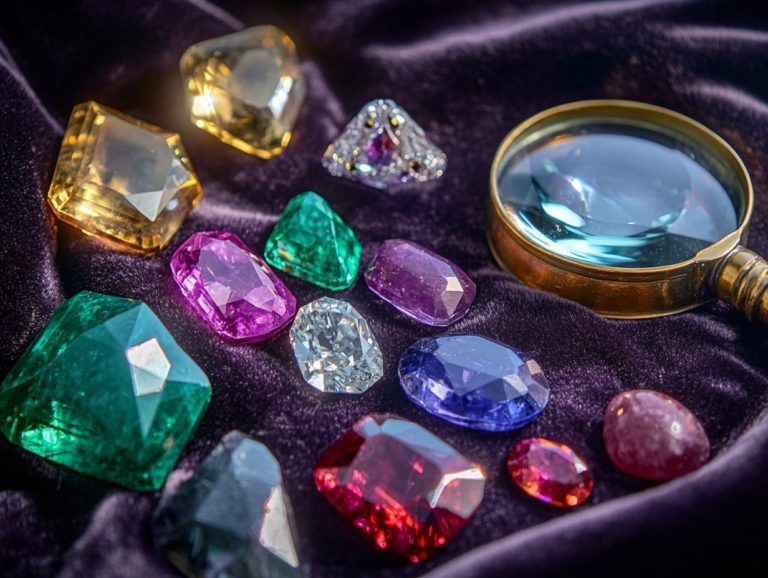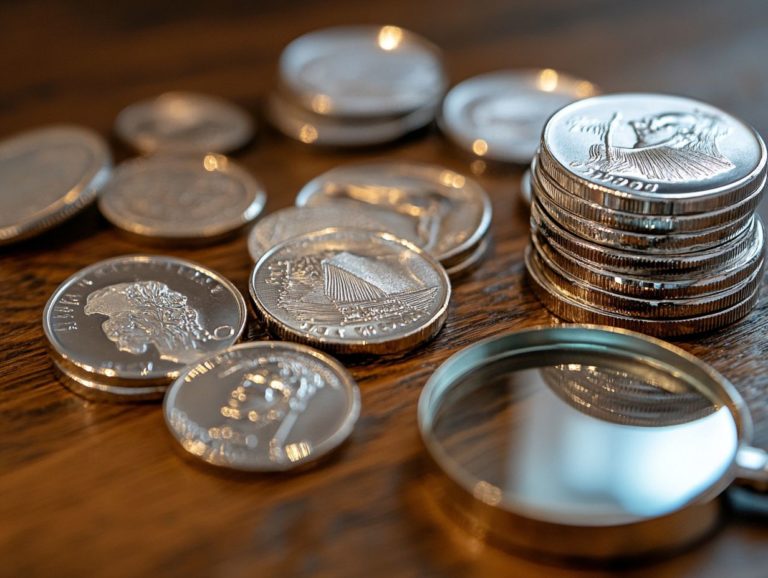5 Best Practices for Selling Precious Metals
Selling precious metals can often resemble navigating a labyrinth. Yet with the right insights, you can significantly enhance your returns and make well-informed decisions.
This guide delves into five essential practices that empower you to secure the best value for your gold, silver, and platinum.
Understanding current market trends, knowing the purity of your metals, and exploring various selling options will equip you with the knowledge needed for a successful transaction.
It also highlights common pitfalls to avoid and offers negotiation tips, ensuring you approach the selling process with unwavering confidence.
Contents
- Key Takeaways:
- 1. Know the Current Market Value
- 2. Determine the Purity of Your Metals
- 3. Find the Right Buyers
- 4. Consider Different Selling Options
- 5. Understand Tax Implications
- What Are the Benefits of Selling Precious Metals?
- Frequently Asked Questions
- What are the 5 best practices for selling precious metals?
- How do I research the current market value of my precious metals?
- Why is it important to find a reputable dealer for selling precious metals?
- What information should I know about the purity and weight of my precious metals?
- How can I negotiate for a fair price when selling my precious metals?
- Why is it important to keep thorough documentation of the transaction when selling precious metals?
Key Takeaways:
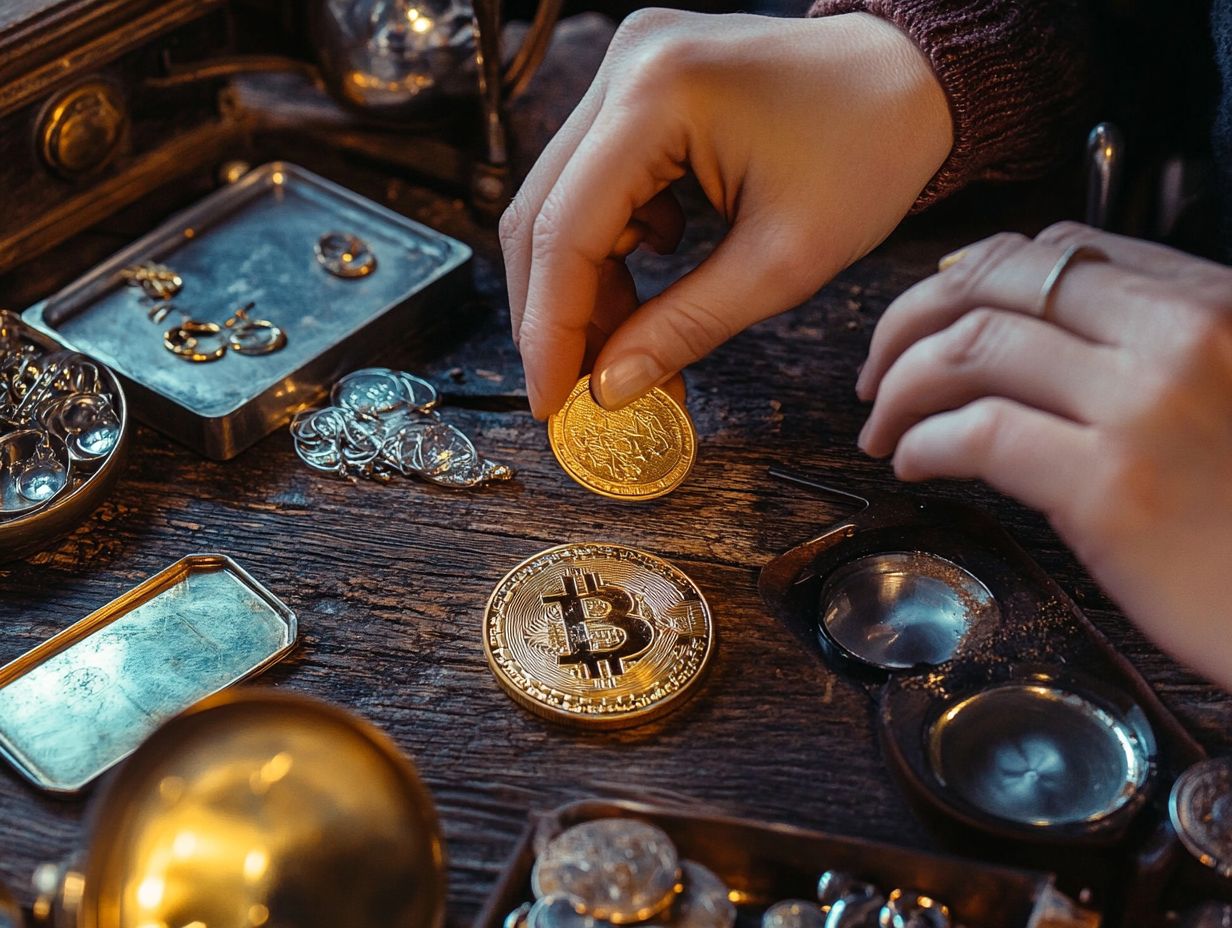
- Stay updated on market values to ensure fair pricing.
- Know the purity of your metals to negotiate effectively.
- Research potential buyers for the best offers.
1. Know the Current Market Value
Understanding the current market value of your gold assets is crucial for making informed financial decisions. This knowledge affects your returns when selling gold.
It also influences your cash-for-gold opportunities and guides your investment strategies in precious metals like jewelry, coins, and bullion bars.
To accurately determine the gold price, you need to consider several factors that influence its market value, such as the global economy, supply and demand dynamics, and geopolitical events.
Staying updated on trends is essential. Platforms like Trading Economics provide real-time data and analysis that can help you make timely decisions.
Setting price alerts can ensure you re notified when gold reaches a particular threshold that aligns with your financial goals.
Looking at past trading trends can further aid you in identifying optimal selling opportunities, leading to better investment outcomes.
2. Determine the Purity of Your Metals
Determining the purity of your gold is crucial for accurately assessing its value. Gold purity levels like 999 purity or 18K gold can significantly influence the worth of your coins, jewelry, and bullion bars when you’re considering selling.
Understanding the gold assay process gives you the power to make informed decisions about your investments.
Various purity levels, such as 10K, 14K, and 24K, not only indicate the gold content but also play a vital role in determining market value.
For example, 24K gold, being the purest, typically commands higher prices than its lower-karat counterparts.
Gold weight conversion is another essential step in assessing value. Knowing how to convert grams to troy ounces streamlines the evaluation process.
Leveraging advanced technologies like an XRF spectrometer a tool that analyzes metals to determine their composition accurately can enhance the accuracy of your gold grading.
3. Find the Right Buyers
Finding the right buyers can make a big difference in your selling experience. This process allows you to pinpoint reputable gold buyers and precious metals dealers while helping you avoid the 5 precious metal investment mistakes that can lead to unfavorable outcomes.
Ensuring you receive a fair appraisal for your assets is key.
Evaluating sources like pawn shops or online platforms can significantly streamline your search.
Look for buyer credentials, such as membership in industry associations or positive customer reviews these indicators can highlight reliability.
When comparing price offers, gather multiple quotes to assess the market value and uncover any discrepancies.
Stay alert for red flags, such as unsolicited offers that seem too good to be true, high-pressure tactics for immediate sales, or a lack of transparency regarding pricing methods.
Act fast! The market can change quickly, affecting your potential profits. By remaining vigilant and informed, you can successfully navigate the marketplace, ensuring a transaction that is both satisfactory and secure.
4. Consider Different Selling Options
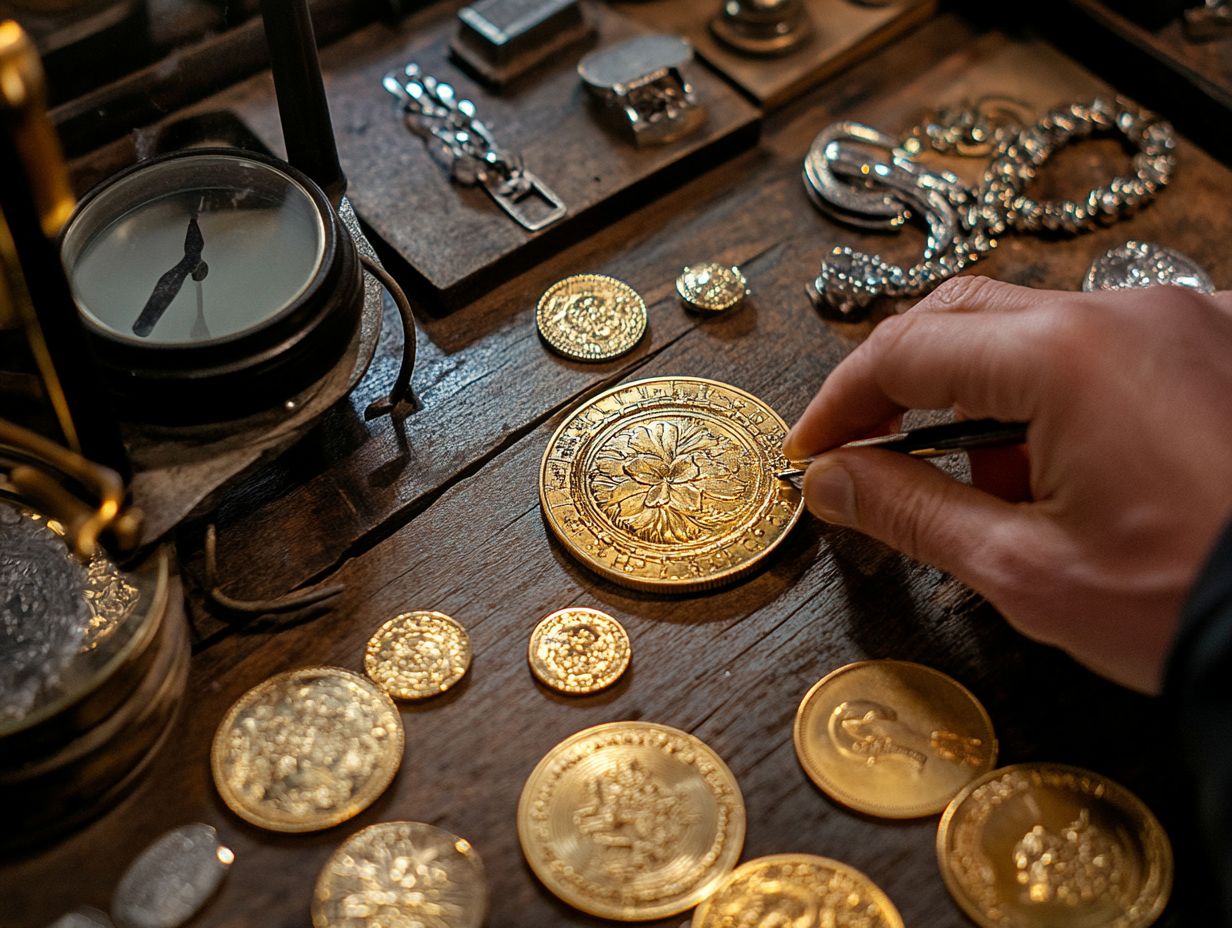
When considering selling your gold, it’s essential to explore various options like auction sites, local markets, online dealers, and even selling scrap gold. Each avenue presents unique advantages and conveniences tailored to your specific needs and financial goals.
For instance, auction sites can potentially yield higher bids. However, be prepared for seller fees and a possibly lengthy wait for payment. Local markets might offer immediate cash transactions, yet they often involve haggling and could lead to lower offers.
Online dealers frequently provide competitive rates and added convenience, sometimes including free shipping kits to streamline the process. However, keep in mind that they may also charge a handling fee that can nibble away at your profits.
Weigh each method’s ease against your priorities. Ultimately, aligning your chosen selling method with your financial targets is crucial for maximizing your returns.
5. Understand Tax Implications
Understanding the tax implications of selling precious metals is crucial for you to maintain compliance and maximize your financial gains. Selling gold can trigger capital gains tax, potentially impacting your broader financial goals.
You need to be careful with these rules, as tax rates can vary based on factors like how long you’ve held the gold and your overall income.
It’s essential for you to keep meticulous records of all transactions this includes purchase prices, sale dates, and any associated fees. This helps you report your earnings correctly and substantiate your claims.
Think about consulting a tax pro they can help you save money! This will ensure that you meet all obligations while optimizing the potential returns from these valuable assets.
What Are the Benefits of Selling Precious Metals?
Selling gold and silver offers fantastic benefits that can boost your finances! It provides liquidity to fuel your investment strategies, enables you to capitalize on shifting gold market trends, and allows you to transform unwanted jewelry or bullion (gold or silver in bulk form) into valuable cash through gold transactions.
By tapping into the value of these metals, you can elevate your investment portfolio. Timing your precious metals sales can significantly impact your financial freedom, offering you the chance to reinvest in more lucrative opportunities.
Understanding market changes is crucial. Recognizing trends allows you to maximize returns, ensuring that your strategic selling harmonizes seamlessly with your broader financial objectives.
What Are the Different Types of Precious Metals?
Understanding the various types of precious metals like gold, silver, and different forms of coins such as bullion and numismatic (coins valued for rarity) is crucial for making informed investment decisions and maximizing your returns when it s time to sell.
This knowledge gives you the power to navigate the ever-changing market dynamics while appreciating the unique characteristics of each metal. For instance, gold is often viewed as a safe haven during economic uncertainty, whereas silver boasts significant industrial applications, creating a diverse landscape of demand.
Being able to distinguish between bullion coins, valued primarily for their metal content, and numismatic coins, which hold collectible value, can greatly influence your selling strategies. By equipping yourself with insights on these distinctions, you re better positioned to assess your portfolio and make strategic choices that enhance your overall financial outcomes.
Key Factors Affecting Precious Metals Value
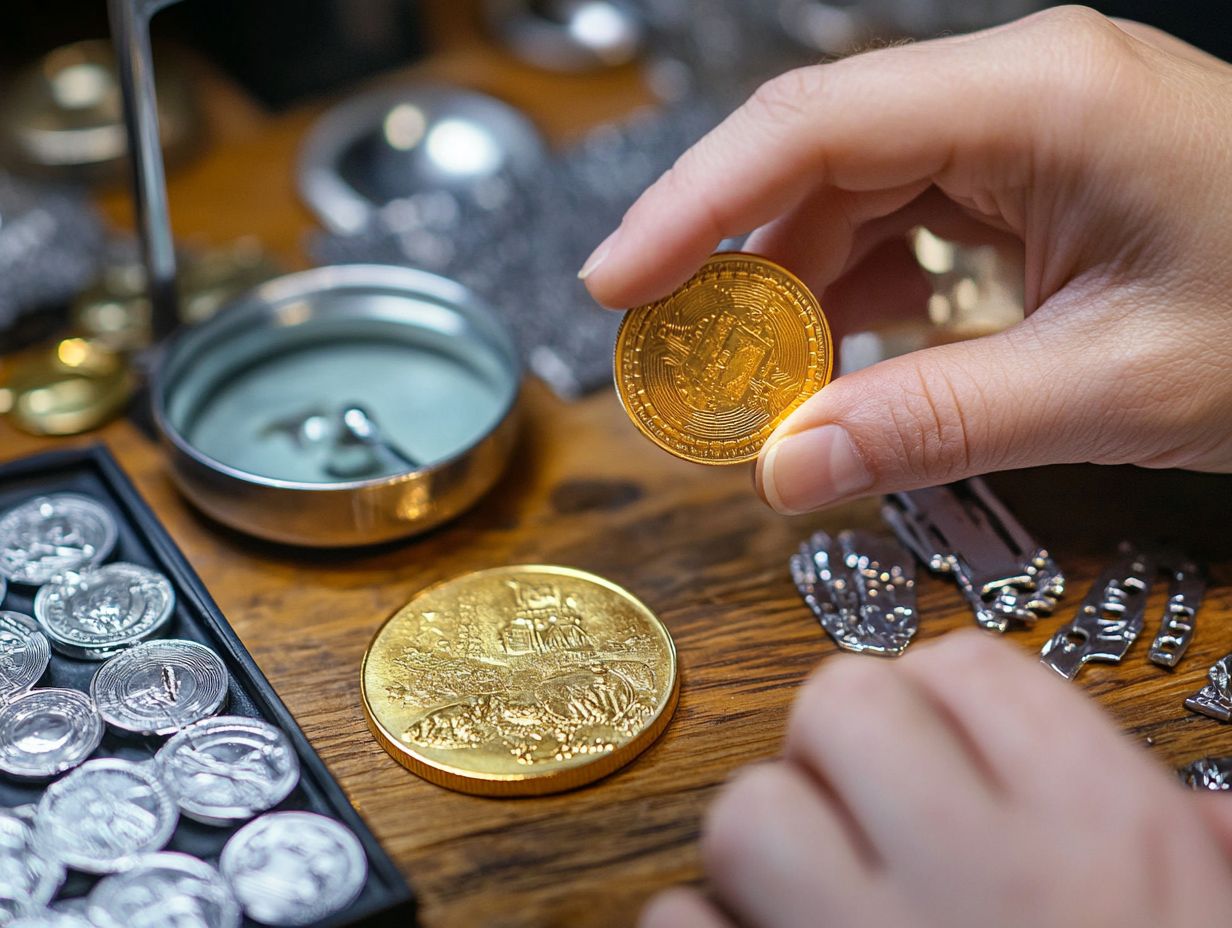
The value of precious metals is shaped by a variety of factors, including market fluctuations, gold quality, and prevailing economic trends. To optimize your selling strategy, a comprehensive understanding of gold pricing analysis is essential.
External economic indicators, such as inflation rates, interest rates, and global political events that can affect the economy, can significantly influence market dynamics. Quality assessments, which encompass various levels of purity and certifications, are critical in determining worth; after all, higher quality often translates to better returns.
Weight considerations are equally important, as the value calculation is directly related to the mass of the metal you possess.
To stay informed, consider leveraging trading economics platforms and setting up price alerts. This approach gives you the ability to make timely decisions based on real-time market developments, ensuring you’re always one step ahead.
How Can One Safely Store and Transport Precious Metals?
Safely storing and transporting your precious metals demands careful thought about security measures, care techniques for gold, and proper maintenance tips. For more insights, check out the 5 must-have tools for precious metals investors. This ensures that the integrity and value of your assets remain intact throughout the process.
Choosing the right location is crucial; a safe deposit box in a reputable bank adds an extra layer of protection against theft or damage. If you prefer to keep your valuables at home, investing in a top-notch safe equipped with advanced locking mechanisms is essential.
In terms of transportation, use discreet, secure bags designed specifically for valuables. Consider opting for insured shipping services to significantly reduce risks. Maintaining an inventory of what you re storing or transporting is also wise for insurance purposes, making claims easier if the need arises.
Safeguarding your precious metals requires a streamlined approach that gives you peace of mind.
What Are the Common Mistakes to Avoid When Selling Precious Metals?
Avoiding common mistakes when selling precious metals, such as overpricing or underpricing your gold, not researching potential buyers enough, and ineffective negotiation tactics, can greatly impact your selling success and bottom line. To enhance your selling strategy, consider these smart tips for buying gold bullion.
To elevate your selling experience, prioritize thorough research on current market trends and pricing benchmarks. It s crucial to leverage reliable online resources and consult with industry experts to determine a fair valuation.
When comparing offers, always gather multiple quotes. This helps you decide based on both price and the buyer’s reputation.
Hone your negotiation skills to secure better deals; practice active listening, prepare counterarguments, and don t hesitate to walk away if an offer falls short of your expectations.
By employing these strategies, you can sidestep pitfalls and maximize your returns.
How Can One Negotiate the Best Price for Their Precious Metals?
Negotiating the best price for your precious metals demands effective communication and a keen understanding of market trends. This knowledge empowers you to confidently engage with gold buyers and explore how to buy and sell precious metals online, securing advantageous price offers for your assets.
To maximize your negotiation outcomes, it s crucial to set clear objectives ahead of time, defining exactly what you wish to achieve. A savvy negotiator remains well-informed about current market fluctuations, allowing them to assess the value of their assets accurately.
Understanding your minimum acceptable price is essential; it serves as a safety net while keeping discussions fluid and productive. When dealing with potential buyers, fostering an open dialogue invites the exchange of information, which helps build trust and understanding.
This collaborative approach often results in mutually beneficial outcomes, enhancing the chances of reaching an agreeable deal.
Frequently Asked Questions
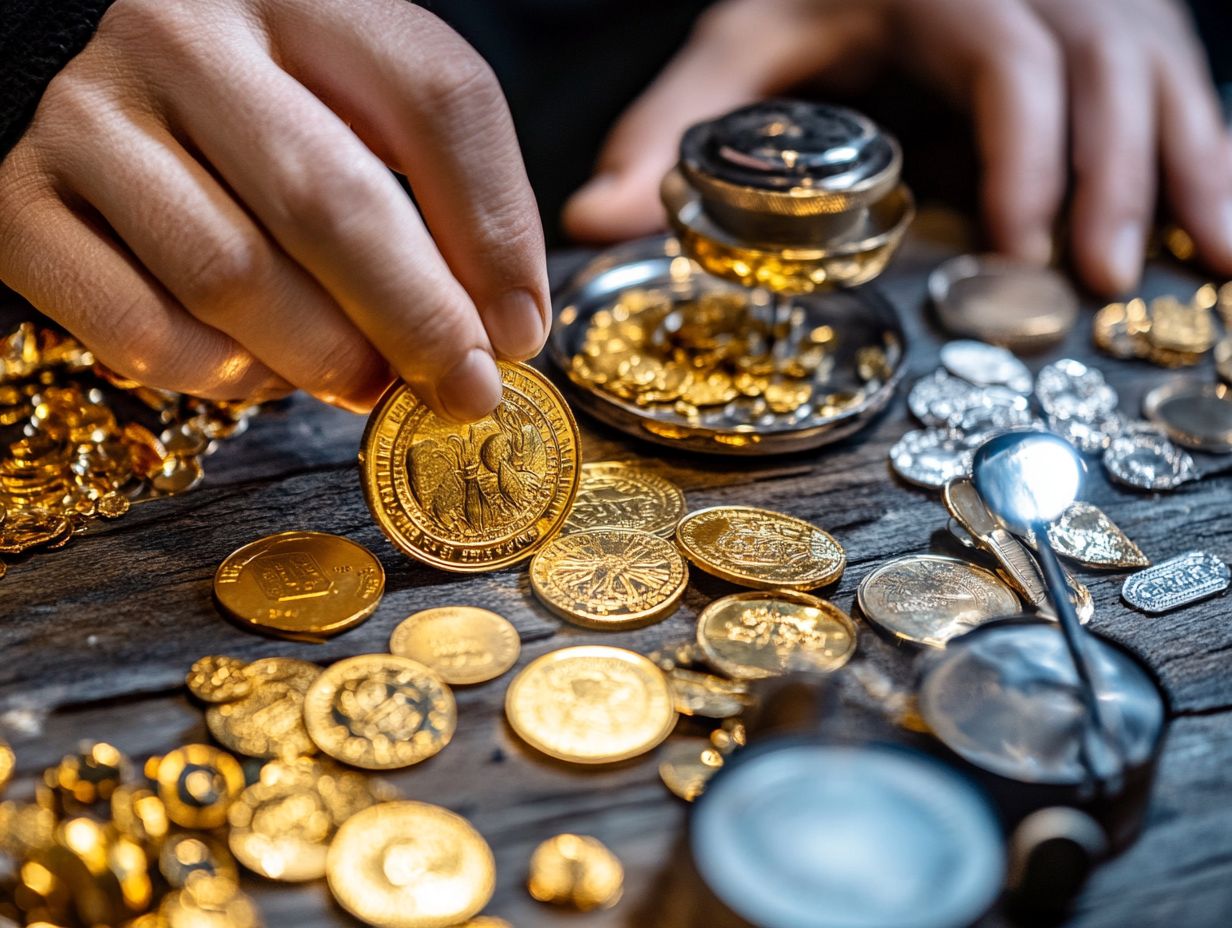
What are the 5 best practices for selling precious metals?
The 5 best practices for selling precious metals are:
- Researching the current market value
- Finding a reputable dealer
- Knowing the purity and weight of your metals
- Negotiating for a fair price
- Keeping thorough documentation of the transaction.
Start implementing these strategies today to maximize your success in selling precious metals!
How do I research the current market value of my precious metals?
Researching the market value of your precious metals is easy. Check financial news websites, online dealer platforms, and market data sites.
You can also ask a trusted dealer for an estimate. This will give you a good baseline for understanding your metals’ worth.
Why is it important to find a reputable dealer for selling precious metals?
Finding a reliable dealer is crucial when selling precious metals, as they have the expertise to evaluate your items accurately. Additionally, knowing how to protect your precious metal investments can help safeguard your assets during the selling process.
This helps you receive a fair price and protects you from scams. Avoiding untrustworthy dealers saves you from potential losses.
What information should I know about the purity and weight of my precious metals?
Before selling, know the purity and weight of your metals. This knowledge aids in negotiating a fair price and can be enhanced by following timeless gold investment tips.
You can confirm purity and weight by testing with a reputable dealer or using a home testing kit. Knowing these details ensures you get what your metals are truly worth.
How can I negotiate for a fair price when selling my precious metals?
Understand the current market value along with your metals’ purity and weight to negotiate effectively. To maximize your returns, consider following the 5 best practices for selling your art collection and compare offers from multiple dealers to find the best price.
Why is it important to keep thorough documentation of the transaction when selling precious metals?
Keeping good records protects you during a transaction. Document the date, price, and relevant details to safeguard against disputes.
Also, retain copies of any receipts or certificates from the dealer. This documentation is vital for your protection.


